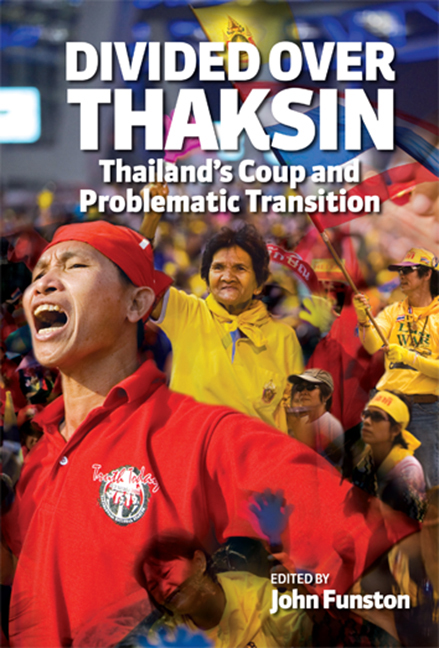Book contents
- Frontmatter
- Contents
- List of Tables and Figures
- List of Contributors
- Preface
- Introduction
- 1 Political Contests in the Advent of Bangkok's 19 September Putsch
- 2 The Tragedy of the 1997 Constitution
- 3 The NESAC, Civil Society, Good Governance and the Coup
- 4 Military Coup and Democracy in Thailand
- 5 Deconstructing the 2007 Constitution
- 6 Thailand's 2007 Constitution and Re-Emerging Democracy: Will Political Polarization Continue?
- 7 Untying the Gordian Knot: The Difficulties in Solving Southern Violence
- 8 Another Country: Reflections on the Politics of Culture and the Muslim South
- 9 Governance in the South: Is Decentralization an Option?
- 10 Tradition and Reform in Islamic Education in Southern Thailand
- 11 The Economy under the Thaksin Government: Stalled Recovery
- 12 The Thai Economy after the Coup
- 13 The Impact of Political Uncertainty on Business
- Index
12 - The Thai Economy after the Coup
Published online by Cambridge University Press: 21 October 2015
- Frontmatter
- Contents
- List of Tables and Figures
- List of Contributors
- Preface
- Introduction
- 1 Political Contests in the Advent of Bangkok's 19 September Putsch
- 2 The Tragedy of the 1997 Constitution
- 3 The NESAC, Civil Society, Good Governance and the Coup
- 4 Military Coup and Democracy in Thailand
- 5 Deconstructing the 2007 Constitution
- 6 Thailand's 2007 Constitution and Re-Emerging Democracy: Will Political Polarization Continue?
- 7 Untying the Gordian Knot: The Difficulties in Solving Southern Violence
- 8 Another Country: Reflections on the Politics of Culture and the Muslim South
- 9 Governance in the South: Is Decentralization an Option?
- 10 Tradition and Reform in Islamic Education in Southern Thailand
- 11 The Economy under the Thaksin Government: Stalled Recovery
- 12 The Thai Economy after the Coup
- 13 The Impact of Political Uncertainty on Business
- Index
Summary
INTRODUCTION
When the Thai Rak Thai (TRT) party won a landslide victory in 2005, Thaksin obtained an absolute majority in Parliament. Still, from early 2006 there were demonstrations against Thaksin, demanding that he step down. He was accused of being corrupt and abusing his administrative power. Political turbulence was further aggravated when opposition parties boycotted the April 2006 general election, which was later declared invalid by the courts. The Thaksin administration was in turmoil until the 19 September military coup in 2006. The military-installed government that succeeded the Thaksin government turned out to be weak, indecisive, and inconsistent in policy implementation. It was not able to lead the country effectively through difficult times.
The tourism industry, representing 6 per cent of GDP, was also badly affected by Thailand' internal problems. There were many incidents in 2007 that discouraged tourists. The New Year' Eve bombings, southern violence, and high oil prices had an adverse impact on the tourism industry. While the number of tourists increased by 20 per cent in 2006, the first quarter of 2007 witnessed a sharp decline with the growth rate dropping to 5.8 per cent. By the second quarter, tourist numbers increased by a meagre 0.4 per cent. A small increase of 2.2 per cent was observed in the third quarter. For the whole of 2007, the tourism industry experienced a slump, although other Asian countries enjoyed boom times.
There is no doubt that these problems depressed the Thai economy, resulting in slow output expansion compared with the rest of the world. The Thai economy in 2007 was one of the slowest growing in the region (see Figure 12.1). In this globalizing era, when countries are competing to raise standards of living, any economy that expands at a rate lower than the world average will have difficulty catching up with more advanced countries. The income gap between Thailand and Malaysia is widening, while the income gaps between Thailand and other fast-growing economies like Vietnam, China, and India are narrowing. The Thai economy was a laggard in 2007; it failed to take advantage of the expanding world trade.
Since high level of income is an outcome of cumulative growth in the past, a small per cent difference in the growth rate, if maintained for a decade, would result in substantial difference in per capita income.
- Type
- Chapter
- Information
- Divided Over ThaksinThailand's Coup and Problematic Transition, pp. 172 - 188Publisher: ISEAS–Yusof Ishak InstitutePrint publication year: 2009

